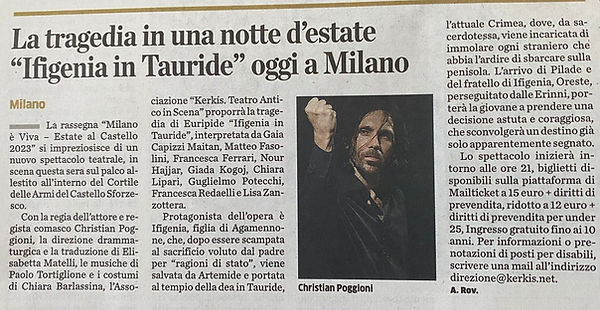
IPHIGENIA IN TAURIS
by Euripides
 |  |  |  |  |  |
|---|---|---|---|---|---|
 |
Photos by Artphotogram
“Primogenito germoglio del talamo, mi ha generato e nutrita la misera figlia di Leda come vittima sacrificale per l’offesa paterna.”
Euripides presents an episode the tragedy Iphigenia in Aulis, according to which Iphigenia, daughter of Agamemnon, was the victim of her father's “reason of state”, who sacrificed her on an altar to allow the Greeks to depart for Troy, as requested by Artemis. In reality, Iphigenia had been rescued by the goddess herself and taken to the region of the Tauri on the Black Sea, where the superstitious king Toante entrusted her with the task of sacrificing all foreigners who landed in the region to the goddess.
The plot opens on the day when her brother Orestes and his faithful friend Pylades, after a long voyage, arrive in that very land with the task of stealing the statue of Artemis, according to Apollo's precise orders, and are captured to be sacrificed.
After intense dramatic tension and a long series of misunderstandings that sometimes border on comedy, the brother and sister, who was believed to be dead, recognise each other, and she saves him after almost killing him. Iphigenia, Orestes and Pylades plan their escape back to their homeland, where the long chain of murders that has torn the house of Atreus apart for generations can finally come to an end.
The cruelty of human sacrifice is the tragic crux of this drama, where the violence practised by the Taurids is juxtaposed with the equally serious violence within the family feud of the House of Atreus, where Orestes had been guilty of murdering his mother Clytemnestra, who in turn had avenged the sacrifice of her daughter Iphigenia by killing her husband Agamemnon, considered responsible, without imagining that the girl had been saved by the goddess and was in Tauris.
In the most intense moments, the tragedy is lightened by surprising tricks typical of the tragicomic genre, which also engage the actors on stage in an appropriate interpretation.
Stage direction: Christian Poggioni
Translation and dramaturgical direction: Elisabetta Matelli
Music: Paolo Tortiglione
Chorus: Lucia Amarilli Sala
Set design: Dino Serra
Costumes: Chiara Barlassina
The show also took part in the Festival Milano è Viva - Estate al Castello 2023, where it was a great success with audiences and critics alike. Also, the show was mentioned in the daily newspaper “La Provincia di Lecco, di Como e di Sondrio”.

Winner of the First Prize for Theatre Performances at the fifteenth edition of the “Teatro Festival Valtellina - Valchiavenna 2023”
The jury said: 'For having splendidly won us over, skilfully involved us and catapulted us with grace and force into that fascinating mythological world where Aristotle's three unities of action, time and place are nullified within a dreamlike vision; for the powerful, effective, compelling and overwhelming narrative and explosive force of love, friendship and solidarity. For the superb and inspired interpretation in bringing to life characters enveloped in tormented and sweet reality; for poetic and touching, tender and vibrant acting enhanced by slow, solemn, sacred gestures. For the permeating and magnetic music, for the pure, archaic songs and sounds capable of recounting the power of pure love and the horror of intrigue and war; for a very evocative set design of essential elements, balanced with an immanent and transcendent beauty.




